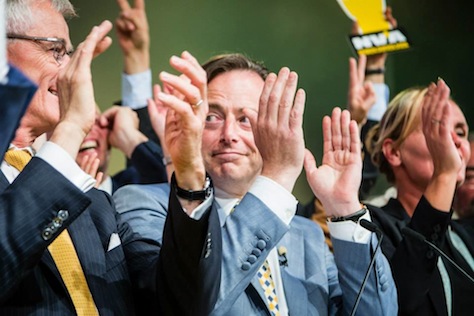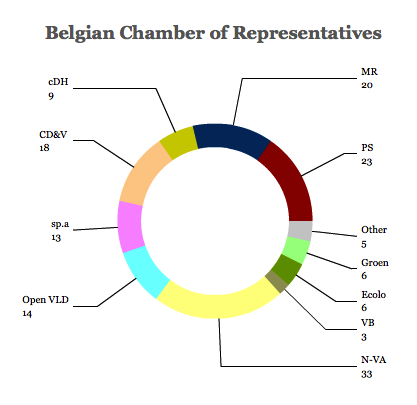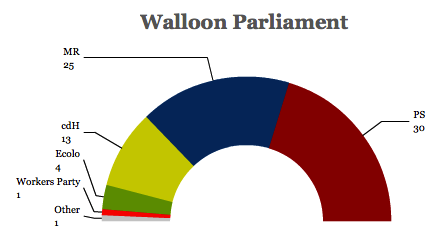In Belgium, where national and regional elections were largely overshadowed by the simultaneous European parliamentary and Ukrainian presidential elections, Flemish nationalist Bart De Wever is working to assemble a broad center-right government from parties of both of Belgium’s linguistic regions.![]()
Realistically, however, though Belgium’s king Philippe, has given De Wever through tomorrow, June 10, to report back on possible coalitions, there’s a chance that Belgium’s coalition-building process could take months, if not the 541-day ordeal that followed the previous May 2010 national elections.
De Wever’s Flemish nationalist Nieuw-Vlaamse Alliantie (N-VA, New Flemish Alliance) emerged as the clear winner of the May 25 Belgian federal elections. It won, by far, the largest share of the vote — 20.26% of the national vote, even though nearly all of it came from Flanders, where it outpolled the center-right CD&V by a margin of 32.22% to 18.47%. De Wever (pictured above), having lost an astonishing amount of weight through diet and exercise since the last election, has given the N-VA a new look, too. While it remains officially in favor of Flemish independence, it’s toned down its support for separation and increased its calls for greater regional autonomy. The N-VA has also enhanced its calls for tax cuts and a trimmer federal and regional budget.
That was enough to put the N-VA in the driver’s seat for the first round of post-election negotiations. Belgium’s king Philippe appointed De Wever as informateur, whose role is to report back to the Belgian king as to potential coalition possibilities. If De Wever can point to a credible governing majority, it’s possible Philippe will appoint him as formateur, officially charging him to form a government.
Outgoing prime minister Elio Di Rupo, the head of the French-speaking, Wallonia-based Parti Socialiste (PS, Socialist Party), is not expected to lead a second government, even though his party emerged as the second-largest in the 150-member Chamber of Representatives (Kamer van Volksvertegenwoordigers/Chambre des Représentants), and the largest vote-winner in French-speaking Wallonia.
Therein lies the awkwardness of the federal negotiations. The largest share of Flemish voters overwhelmingly supported an autonomist, center-right party, while the largest share of Walloon voters supported a federalist, center-left party.
De Wever is working to form a government of both Flemish and Walloon center-right, Christian democratic and liberal parties. But that would require a historic effort, given that Francophone parties have refused to work at the federal level alongside the N-VA in the past. Moreover, any Walloon parties willing to join forces with De Wever could face the wrath of Walloon voters at the next election.
Since the May 25 elections, the shape of Belgium’s regional governments have come increasingly into view, which will in turn influence the national government formation process.
Last week, Di Rupo’s Socialists announced that they would open coalition negotiations with the centrist, Christian democratic Centre démocrate humaniste (cdH, the Humanist Democratic Centre) to form a government in the 75-member regional parliament of Wallonia:
The Walloon deal comes at the expense of the center-right, liberal Mouvement Réformateur (MR, Reform Movement), which made the greatest gains at the regional level, picking up six additional seats and which nearly outpolled the Socialists. The MR’s leaders are already decrying the deal between the Socialists and the cdH, arguing that they instead have the momentum to form a new Walloon government.
The MR’s disappointment is amplified by the apparent coalition deal to lead the Brussels regional government, where the Socialists and the cdH intend to form a government with the Fédéralistes Démocrates Francophones (FDF, Francophone Democratic Federalists), until 2011 part of the MR coalition.
For now, the N-VA will likely become the senior partner in the Flemish government, continuing a partnership with the center-right Christen-Democratisch en Vlaams (CD&V, Christian Democratic and Flemish).
But because of the N-VA’s gains, largely at the expense of the CD&V, it’s unlikely that the CD&V’s Kris Peeters will remain as the minister-president of the Flanders region. Peeters and the N-VA’s Geert Bourgeois, who has served as vice-minister-president under Peeters since 2009, are leading the current negotiations for the Flemish government.
So what does all of this mean for the federal negotiations?
First, the three major liberal and center-right Flemish parties, the N-VA, CD&V and Open Vlaamse Liberalen en Democraten (Open VLD, Open Flemish Liberals and Democrats), together hold 65 seats — just 11 short of an absolute majority in the Chamber of Representatives. It’s unlikely that De Wever would attempt to bring the fourth major Flemish party, the Socialistische Partij Anders (sp.a, Socialist Party Different), into an all-Flemish government, which would be massively controversial among Francophone voters. But that doesn’t change the fact that the three Flemish parties will almost certainly form the core of any center-right federal government, even one that contains one or more Francophone parties.
Secondly, with Di Rupo’s Socialists firmly headed to control the next Walloon and Brussels regional governments, there will be a significant buffer between any center-right federal government and the center-left voters in Wallonia. That should ameliorate, to some degree, Walloon concerns about what could be a right-leaning, Flemish-dominated government.
Thirdly, given the rupture between the Socialists and the MR, there’s a fair chance that the MR might be willing to join a largely center-right Flemish front. But there’s a bigger question as to whether the cdH, now pushing ahead with a Walloon regional coalition with the Socialists, will be willing to join the MR in a federal government. De Wever and the N-VA would almost certainly need both parties to argue that his government can credibly represent Walloon interests.
Fourthly, now that the N-VA is the senior partner in Flanders, likely to take the minister-president post at the Flemish regional level for itself, that leaves Peeters, the leader of the CD&V, awkwardly out of a job. But if it’s controversial that the N-VA might become the largest member of Belgium’s national government, it’s even more controversial that De Wever could become prime minister. To the extent that Francophone parties like the liberal MR or the Christian democratic cDH are willing to consider joining a center-right federal government, it would be much easier if Peeters, rather than De Wever or any N-VA official, becomes Belgium’s next prime minister.
Fifthly, though Di Rupo’s Socialists lost ground in the last election, the coalition that he assembled in December 2010 still commands 97 seats in the newly elected Chamber of Representatives. So the possibility of a similar coalition can’t be ruled out, especially if the MR and/or the cdH decide that partnering with the N-VA at the federal level is simply too toxic. It would require the Socialists, the cdH and the MR to join together in common cause at the federal level once again, which could be difficult after the MR’s exclusion from both the Walloon and Brussels regional governments. It would also require the Open VLD, the sp.a and the CD&V to abandon the N-VA at the federal level too, which might be dangerous in light of the N-VA’s dominance in the Flemish regional government.
But it’s a coalition that would nonetheless command majorities of both the Flemish and Walloon parliamentary blocs. To the extent that neither the MR nor the Open VLD or the CD&V are enthusiastic to give the leftist Di Rupo another term as prime minister, it’s possible that Peeters or the MR’s leader, Didier Reynders, deputy prime minister since 2004 and a former finance and foreign minister, could bring this coalition together instead.
No matter what happens, it’s safe to bet that Belgium’s next government will take months to form, not weeks. A government in place by the autumn, by Belgian standards, would be something of a success.



